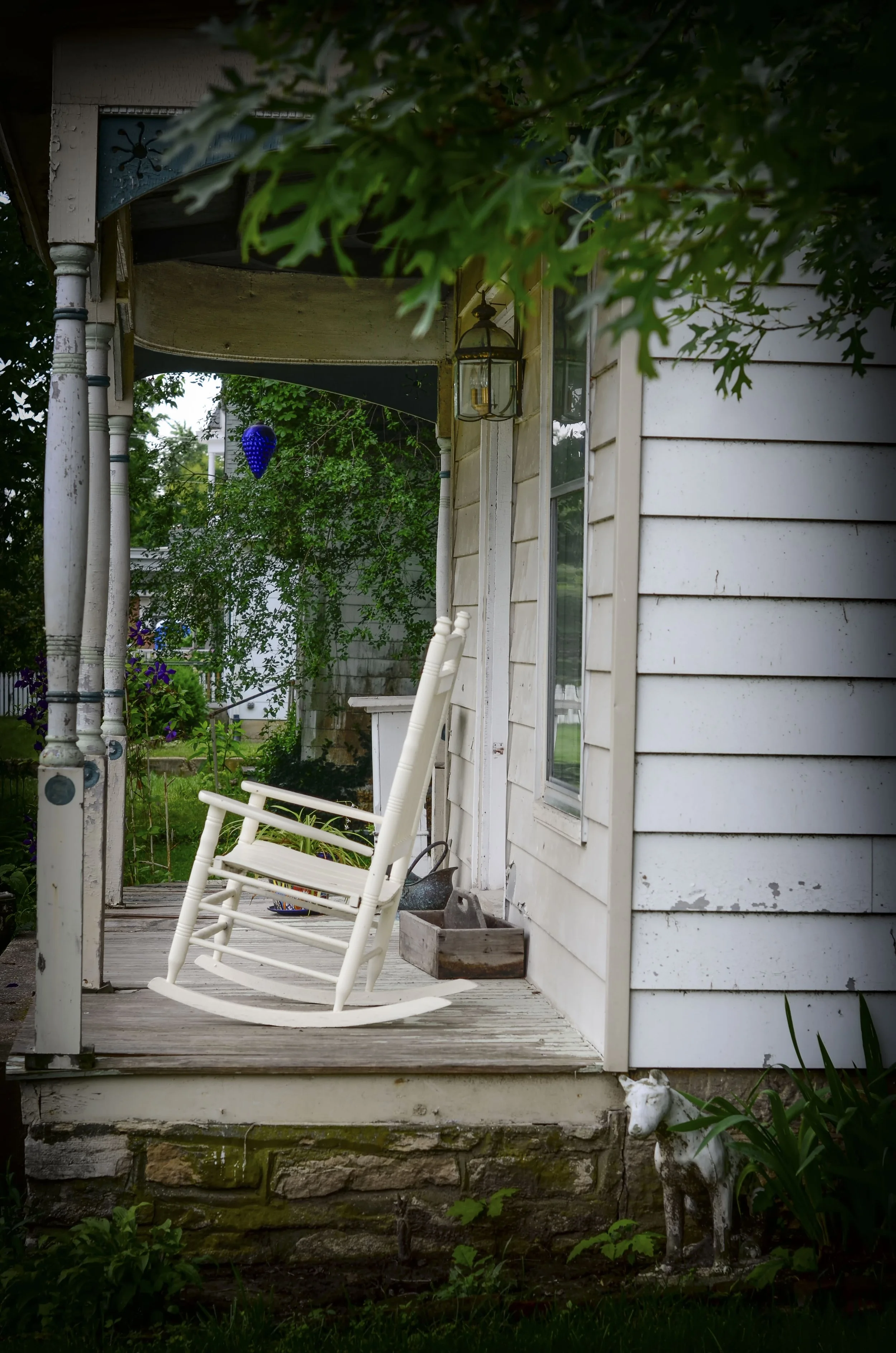We spotted her the other day, idling by her old house — again. Same car (sans husband, who we heard was either dead or perhaps bedridden), same time of day, same slow roll past the patio arbor, now leaning ever so slightly like it's tired of holding up memories. It’s a ritual, we’ve come to realize. A quiet one. And strangely, one we understand more than we expected.
When we moved to Snob Hill three decades ago next month, she was part of a tight cluster of older women who had already claimed this hillside. They’d been here for decades, forming a social order as stratified as the bedrock beneath their foundations. We were the new kids — in our mid-30s, full of ambition and fatigue, with a five-year-old in one hand and a bun in the oven. Our second son was born just three months after we moved in. For over a decade, ours were the only small children on the hill, their shouts echoing off the allée of canopy-touching mature trees (now almost all gone or replaced) like a declaration of change. The old guard didn’t always take kindly to that noise — or us. We had our clashes, politely, with nervous hands and tight smiles.
But now, thirty years later, we find ourselves part of that old guard, watching as new families arrive with their own sticky-fingered futures and sippy cups.
Her house — the one she drives past and still known by her family’s surname (as in, The ‘X” House) — is back on the market now. And we wonder: Who will buy it? Will they plant hostas, paint the front door a regrettable yellow, or tear out the yard’s “best’ feature, a white azalea? Her drive-by ritual has made us reflect on our own, especially as we trade light waves as she travels by, usually without stopping.
We don’t often drive by our first house — that suburban ranch one of our fathers once whispered looked like “a double-wide…with ideas” and where we lived for eight years before landing on Snob Hill. But every few years, we cruise down the old cul-de-sac and take inventory. The yellow paint we so happily chose, now replaced with something blander, but more tasteful. The heirloom apple tree (a tradition that continues here) is gone — cut down without ceremony — and the decorative gable cutouts we designed to make the house less cookie-cutter, more home, have been stripped away. That house tried so hard to be something — and so did we.
We over-engineered the back deck (to survive a nuclear winter, we joked), and when we last drove by, it was still there — though the jigsaw-cut spindles we crafted by hand from 1x10s had been replaced with ubiquitous square 2x2s. They were never quite vases, never quite Gothic, but they were ours.
And then it hit us. This isn’t just our ritual, or hers. It’s part of a much older tradition, stitched into both our family histories. We've traveled with each other’s in-laws to see the first homes they bought. We've stood in front of long-gone porches with parents and listened to them say things like, "We planted those lilacs back in '53."
One trip we’ll never forget was to Illmo, Missouri — named for the marriage of Illinois and Missouri, though now it’s little more than a crossroads. A great-grandfather built a house there, and his widow — “Granny” — lived in it for 60 years (about 30 of which after he died). We’ve been back many times, including the time we took pictures with a father who once asked to go inside and take measurements. He wanted to have blueprints drawn up so he could recreate the house for himself — a dream never realized. When Granny finally moved to assisted living, she swore she dreamt every night of walking the halls of “her house.”
Another time we drove to Burlingame, Kansas, to see the house where grandparents raised a father in a stately Victorian with a steep staircase he remembered as Everest. He could recall how it felt to climb those steps, not just how they looked. That house, like the Illmo one, felt like a map of the people we loved.
Which brings us back to our elderly neighbor, now just a motorist circling a memory. We never really liked her, if we’re being honest. But there’s something about her ritual that softens us. Maybe that’s one of the lessons Snob Hill still has to teach: the slow work of understanding — others and ourselves.
As Lewis Nordan wrote, “You can’t get lost in a place you’ve never been. But you can get lost in your own hometown.” It’s true. These houses — be they ranches, Victorians, or stone-clad hillside homes — speak in creaks and echoes and shadows. They hold onto our laughter, our best intentions, our failed repairs.
And here’s the kicker: both our sons, now grown men, have independently told us they hope we keep this house in the family. But we don’t have the heart to tell them that probably won’t happen. Someday, maybe, they’ll find themselves idling at the corner, looking up at the windows, remembering how the light fell across the kitchen at dinner, and starting their own drive-by tradition.
As Tennessee Williams once wrote, “Time is the longest distance between two places.”
And maybe that’s why we drive by. To shorten the span just a little. To see if the light is still on.
#SnobHill #StLouisNeighborhoods #LifeOnSnobHill #NeighborhoodStories #NostalgiaDriveBy #HomeMemories #GenerationalHomes #HistoricStLouis #SuburbanLife #MemoryAndPlace
